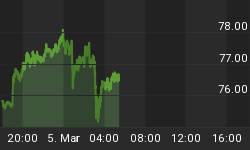With each passing day the number of people that think the bottom is in, earnings will keep improving, and even a correction is unthinkable keeps rising. Here are a pair of interesting headlines moments apart on Bloomberg.
U.S. Stocks Climb to Extend Biggest Quarterly Rally Since 1998
Bloomberg is reporting U.S. Stocks Climb to Extend Biggest Quarterly Rally Since 1998
U.S. stocks rose, extending the market's biggest quarterly rally in a decade, as the government said the economy shrank less than estimated in April through June and earnings at Nike Inc. beat estimates. Oil and metals gained as the dollar slumped, while Treasuries retreated.
"A lot of people would be looking for a pullback, but we're going to see improving fundamentals in the base economy, and with that higher earnings," said William Dwyer, chief investment officer at MTB Investment Advisors, which manages $13 billion in Baltimore.
Today's gains came after the U.S. Commerce Department said the world's largest economy shrank at a 0.7 percent annual rate from April through June, less than the previous estimate of 1 percent and the median economist projection of 1.2 percent. Gross domestic product contracted at a 6.4 percent pace in the first three months of 2009.
The performance of the U.S. economy is probably more sluggish than reflected in stock markets, risking a correction in equities, Nobel Prize-winning economist Michael Spence said.
U.S. stock-market investors have "over processed" the stabilization of growth in the world's largest economy, Spence said in an interview in Kuala Lumpur yesterday. The U.S. economy isn't likely to experience a "double-dip" slowdown even as that remains a risk, said the professor emeritus of management in the Graduate School of Business at Stanford University.
I would be curious as to what William Dwyer, chief investment officer at MTB Investment Advisors was saying in 2008. Regardless, the idea that stock can keep rising forever even as the fundamentals of the economy are horrible, and the only game in town is government spending is rather remarkable.
As for the double-dip, I think one is coming. The not so robust alternative is flatline stagnation and extremely slow growth for 5 years or more.
Just moments after the above headline appeared, we saw this:
U.S. Stocks Drop as Purchasing Managers Index Trails Estimates
Please consider U.S. Stocks Drop as Purchasing Managers Index Trails Estimates
U.S. stocks retreated after a measure of business activity unexpectedly shrank in September, overshadowing an earlier report that showed the recession abated more than estimated in the second quarter.
The Standard & Poor's 500 Index lost 0.7 percent to 9,678.27 at 9:47 a.m. in New York after the Institute for Supply Management's gauge of business activity slipped to 46.1 in September, lower than the reading of 52 estimated by economists in a Bloomberg survey.
Business activity declines in Chicago area
Market Watch has more details on the PMI in Business activity declines in Chicago area.
More companies in the Chicago area reported business worsened in September, according to the Chicago-NAPM. The Chicago purchasing managers index fell to 46.1% in September from 50.0% in August, the trade group said. Economists were expecting an increase to 52%. The new orders index backtracked to 46.3% from 52.5% in August. The employment index was essentially unchanged at 38.8%. Readings under 50% indicate more firms said business was worsening than said it was improving.
Today a close friend, "HB", pinged me with this thought: "Today's unexpected negative surprise Chicago PMI which is back in contraction, reminds me of 2002. This is how the 2002 waterfall decline began. The trigger was exactly the same, a disappointing PMI."
Fundamentally and technically the market is prime for a huge correction. Sentiment is extreme and the viewpoint expressed by William Dwyer above is consensus. However, it is important to keep in mind that as long as the corporate bond market stays healthy, stocks will likely have a bid. How much longer that remains is anyone's guess.
That said, some cracks are starting to appear. As I pointed out yesterday in Bill Gross Bets On Deflation, the yield curve is flattening substantially and the treasury market is increasingly skeptical of the reflation effort taking hold.















